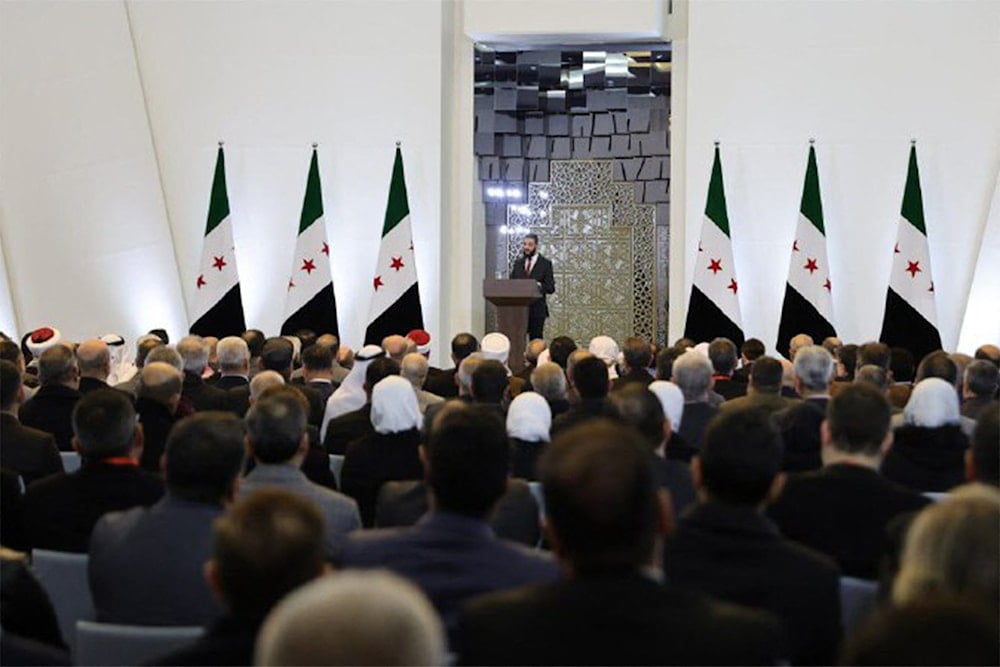Syrian national conference warns that armed groups will be 'outlawed'
Political parties within Syria’s semi-autonomous Kurdish administration condemn what they describe as the “token” representation of minority groups at the conference.
-

This handout picture released by the official Syrian Arab News Agency (SANA) shows Syria's interim president Ahmad al-Sharaa addressing representatives and dignitaries of Syrian communities during the National Dialogue Conference called for by the country's new authorities in Damascus on February 25, 2025 (AFP)
The final statement of the Syrian National Dialogue Conference emphasized the need to safeguard the unity of Syria and uphold its full sovereignty over all its territory, firmly rejecting any form of partition, division, or relinquishment of any part of the homeland, the state-run Syrian Arab News Agency (SANA) reported.
“We condemn the Israeli infiltration into Syrian territory as a blatant violation of the sovereignty of the Syrian State, demand its immediate and unconditional withdrawal, reject the provocative statements by the Israeli Prime Minister, and call on the international community and regional organizations to assume their responsibilities toward the Syrian people and exert pressure to stop the aggression and violations,” participants asserted in the final statement of the conference that concluded its activities on Tuesday.
Participants also advocated for "a monopoly on weapons by the state" and a new professional national army, cautioning that any "armed formations outside the official institutions" would be "outlawed".
The statement called for expediting the adoption of a temporary constitutional declaration tailored to the transitional period’s requirements, ensuring that constitutional gaps are promptly addressed to accelerate the functioning of Syrian state institutions.
It further underscored the importance of promoting freedom as a fundamental societal value, recognizing the sacrifices made by the Syrian people to achieve it, and ensuring the protection of freedom of opinion and expression.
The final statement stressed the need to respect human rights, support women's participation across all sectors, safeguard children's rights, provide care for individuals with special needs, and enhance the role of youth within the state and society.
It also rejected "all forms of discrimination based on race, religion or sect and the achievement of the principle of equal opportunities."
Additionally, the statement called for implementing transitional justice by holding perpetrators accountable for crimes and violations, reforming the judiciary, and enacting the necessary legislation and mechanisms to ensure justice and the restoration of rights.
The statement also urged political development based on principles that guarantee the participation of all segments of society in political life, and the issuance of appropriate legislation to facilitate this process.
Finally, the statement emphasized the need to drive economic development by strengthening the agricultural and industrial sectors, adopting incentive-driven economic policies that foster growth, encouraging investment, protecting investors, addressing citizens' needs, and promoting national prosperity.
'Conferences with token representation meaningless, worthless': Syria’s semi-autonomous Kurdish administration
Meanwhile, political parties within Syria’s semi-autonomous Kurdish administration have condemned what they described as the “token” representation of minority groups at the conference.
In a joint statement, 35 parties asserted that “conferences with token representation… are meaningless, worthless, and will not contribute to finding real solutions to the country's ongoing crisis."
The Kurdish administration affirmed that it will "not be a part" of implementing the recommendations of the conference.
The statement stressed that a "real national dialogue conference must be inclusive," adding that the composition of the current initiatives "do not reflect the reality of the makeup of Syrian society."
Organizers stated that the Kurdish administration—which controls vast territories in Syria’s north and northeast, including key oil-producing regions—and its affiliated bodies were not invited because armed groups were excluded from participation.
The US-backed, Kurdish-led Syrian Democratic Forces (SDF) function as the Kurdish administration’s de facto military force.
Hassan Mohammed Ali, a Kurdish administration official, told AFP that the exclusion would have "negative repercussions and will not lead to solutions to the problems and crises that Syria has been suffering from for decades."
He cautioned that "a conference without all Syrians' participation will lead to... decisions reflecting a single tendency."
SDF spokesperson Farhad Shami also told AFP that "the exclusion of the SDF and large sections of Syrian society confirm that the conference serves to please the outside world and not to seek a better future."
It is noteworthy that Syria’s new authorities, who maintain close ties with Ankara, have called on all armed groups, including the SDF, to disarm and have rejected any form of Kurdish autonomy.
Read more: Macron calls for integrating Western-backed SDF into Syrian forces

 4 Min Read
4 Min Read










